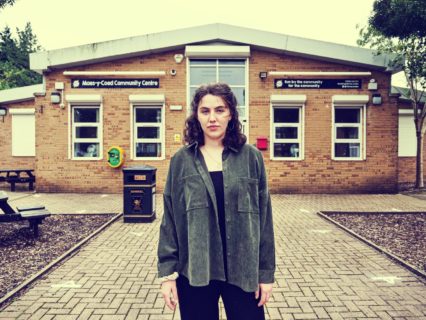Marine Furet visits the Sherman Theatre to experience their first instalments of their ‘Innovative Audio Theatre Series’, Heart of Cardiff.

A war veteran shares his memories of German internment camps with his great-grandson amid the political turbulence resulting from the murder of George Floyd. A young woman walks the streets of Heath on the eve of her relocation to Bermuda. A legendary boxer advises a young single mother in Cathays Cemetery. A panther appears in Fairwater and changes the fate of one of its inhabitants.
The Sherman Theatre’s Heart of Cardiff series teases out the joy and bittersweetness of transmission and the importance of place in any process of bonding. The instalments so far (four out of the intended ten) evince a strong feel-good atmosphere – a balm for an audience struggling with the fragmentation of their community through local and national lockdowns. Each piece ends on a sense of comfort, reconciliation, and reencounter with self and others, along with an invitation to go and (re)discover the parts of Cardiff evoked in the plays. Heart of Cardiff includes a website dedicated to releasing the plays with a blog that showcases letters to Cardiff sent by residents across the city. One strand of the project, ‘Love Letters to Cardiff’, is designed to involve an older audience, inviting people over the age of fifty to share their memories of the city.
The plays showcase the work of both confirmed and novice Welsh writers. Nia Morais, the author of Crafangau, has just graduated. Her play, performed in Welsh by Manon Eames and Mali Ann Rees, and directed by Jac Ifan Moore, is a confident foray into magical realism. The story explores themes of racism and abuse through the lens of a narrator confined to stifling white beauty standards by her grandmother. Morais is particularly apt at finding beauty in moments of darkness and at portraying the subtle violence at play in the banal gestures. Written in lyrical, poetically charged language, the play takes full advantage of the musicality of Welsh to advance its heroine’s transformation. Like a number of pieces in the series, the female protagonist at the core of Crafangau must gradually come into her own by taking a more aggressive stance, in a shift beautifully rendered by Mali Ann Rees’ interpretation. This arc echoes the fate of the main characters of Peerless, an atmospheric drama written by award-winning playwright Owen Thomas and directed by Joe Murphy. Like Crafangau, Peerless stands out for its poetic style. The play is entirely written in rhythmical verses, marked by repetitive rhymes and beats. Kirsty’s (Bethany Wooding) nightly encounter with a Boxer (Alex Harries) in Cathays cemetery is told through a series of symmetries and echoes, between a young woman exhausted by the hard hand life has dealt her and the boxer who gives her a chance to punch back. The story is inspired by the life of ‘Peerless’ Jim Driscoll, a Cardiff-born boxer who is one of a number of figures that feature in the series’ nod to local history. Both Crafangau and Peerless are set to the sound of tense ambient electro composed by Eädyth, who also created the soundtrack of Mr Carlos de Pass.

Now offline, the first instalment of the series – Mr Carlos de Pass – written by actor Kyle Lima, similarly pays homage to a Cardiffian: Carlos de Pass (performed by Patrick Robinson), who tells his great-grandson Trix (Lloyd Everitt) of his experience as a soldier in World War II. De Pass, who was born in Jamaica and emigrated to Cardiff, is portrayed as a benevolent, comforting figure, whose hope in the face of adversity contrasts with the frustration and distress expressed by Trix, who is faced with racist attacks and violence. The play briefly alludes to the case of Siyanda Mugaza, and there is a muted sense that the urgency of its topic goes slightly beyond the series’ nod to local heritage. However, the dialogue ultimately focuses mostly on de Pass’ service in the army and his service to the nation and the community of Butetown he hailed from. As Literature Wales is kickstarting its first Professional Development Programme for Writers of Colour, it seems that Welsh organisations are beginning to find the institutional impetus to support and foster the expression of Wales’ black and brown communities. Mr Carlos de Pass testifies to the acknowledgement of the contributions of black people and migrants to the construction of Cardiff – but also to the (perhaps more difficult) work of accounting for current tensions.
As Eädyth’s work on the soundtrack of three out of four plays testifies, projects such as this one are an excellent opportunity for young composers to put their work out in the world. I was particularly interested, however, in the use of sound in Goodbye Memory Lane, Emma Cooney’s walking narrative that follows its heroine through the streets of Heath in 3D stereo (the term the Sherman Theatre uses to describe the immersive effect of binaural panning). The piece comes complete with a map that allows the audience to retrace the footsteps of the protagonist as she revisits the places of her first kiss, her first successes, and her most bitter disappointments. Sue, played by Kezrena James, is preparing to launch herself into the unknown. Tic Ashfield’s clever use of sound to suggest distance, both mental and physical, and urban sounds, sustains Cooney’s meditation on home as a place that nurtures and restrains, sometimes at the same time.
In the age of podcasts and audio dramas, it is clear that formats such as these will be faced with the need to define their genre. As we are expecting the series’ next release – Mali Ann Rees’ Bratiaith – it will be interesting to see if Heart of Cardiff furthers its investigation of the haunted aspects of the city – its forgotten spaces, heroes, and stories – and of the possibilities of sound.
To find out more about the Sherman Theatre’s Heart of Cardiff audio theatre experiences, visit their mini-site here.
Marine Furet is a regular contributor at Wales Arts Review.
For more Wales Arts Review coverage of National Theatre Wales, including news, reviews, and interviews, click here.












